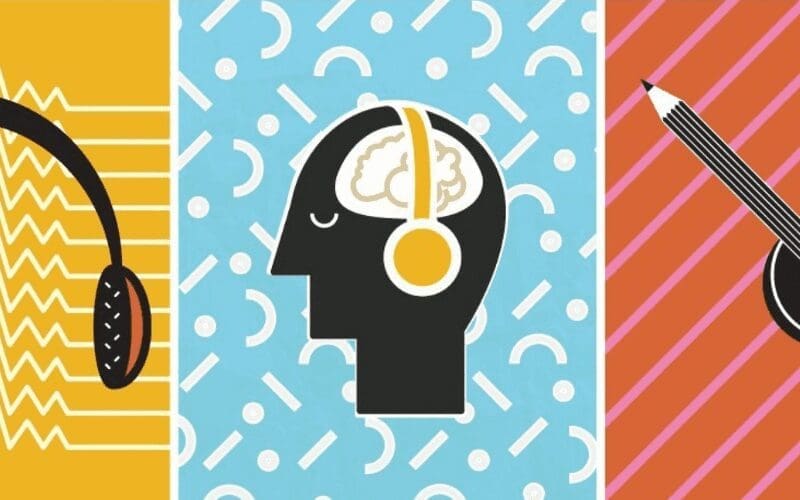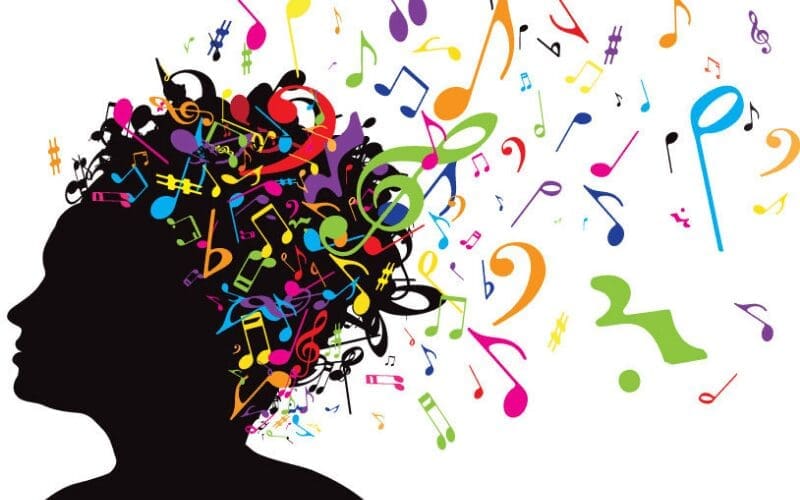If you’re reading this blog, it’s probably safe to assume you are a music lover. But the all-important question is, how does music affect your mood? We all have lots of examples from personal experience where music has influenced the way we feel; how music can draw a smile or tear or make us want to dance or lie down. But the connection between music and our brains is much deeper than you might think. There is extensive research on how music affects our mood.

For example, did you know that according to studies carried out by the University of Oxford, we associate higher-pitched noises with sweeter tastes and lower-pitched sounds with sour tastes? Or that volume can have an effect on our perception with high decibel levels associated with a lower sensation of taste.
Ever wondered why airplane food tastes so bland? It’s because a plane is a loud environment and your sense of taste is dulled in that environment!
In this article, we’ll answer the question of how does music affect your mood. We will also look at some examples of how music affects your mood. and also answer and what that means for us as creatives and as fans of music.
Be sure to stay tuned until the very end so you don’t miss out on any key information!
How Does Music Affect Your Mood?

When you listen to music, your brain responds in a very physical way. Typically your brain produces dopamine which affects our emotions and feelings.
It is also part of your brain’s reward system and improves your mental health. What is interesting is that the type of music you listen to might have an influence on the way you feel.
With music that could be classed as upbeat or happy in terms of its genre generally making people feel happier. Particularly if they listen to music with the intention of feeling happier.
A 2013 study by Positive Psychology (Ferguson YL, Sheldon KM) compared how listeners were able to report higher feelings of general happiness when listening to the positive music of Copland rather than the more sombre Stravinsky.
The same study also asked one group of participants to listen to the positive music of Copland with the intention of becoming happier and another group to just listen to the music without any instruction of how to feel.
The study found that the group that had been instructed to feel happier were able to report improved levels of happiness within weeks. On the other hand, the group that listened without instruction saw very little change.
Reducing Anxiety & Depression

Taking the effect of music on mood even further, music can also help reduce symptoms of depression and anxiety in patients suffering from conditions such as Parkinson’s disease, stroke, and dementia.
Raglio et al’s study in 2015 found that music therapy can effectively reduce anxiety and depression in patients suffering with these conditions.
Interestingly, they also noted again that the kind of music listened to has a substantial effect; classical and meditative music saw more positive results whilst heavy metal and techno were either ineffectual or in some cases detrimental.
While this clearly shows music can positively affect your mood, there is a negative side to this coin. Music is also a form of torture in some instances.
The IRA and FBI in the 70s and 90s adopted what American Psyops (Psychological Operations) called ‘torture lite’ methods (as opposed to ‘heavy’ torture which was banned). This involved loud music and strobe lighting pumped into cells.
These techniques also drew headlines again in the late noughties when The Guardian reported that American troops in Iraq blasted songs like Metallica’s ‘Enter Sandman’ and Eminem’s ‘White America’ and high volume to break captured Iraqi soldiers.
Reducing Stress

The idea that music can reduce stress and is long-established and there are many examples to support this hypothesis. This includes an interesting study in 2013 by Thoma et al. Three groups of participants either listened to music, the sound of water, or was in a control group with no auditory stimulation.
They were then exposed to a stressor before taking a psychological stress test. The group that listened to music had recovered more quickly from the exposure to stress than the control group or the group that listened to rippling water.
Musicians can also benefit from the stress-busting power of music with drumming notably one of the best activities for reducing stress and improving mood.
As part of his book ‘The Healing Power of the Drum’, Robert Lawrence Friedman interviewed clinical psychologist Dr Barry Quinn.
He found that drumming increases the production of alpha waves which occur when the brain slightly relaxes to a pattern of 8 to 12 brainwave cycles per second. Alpha waves are associated with feelings of happiness and euphoria.
They are also associated with being present in the moment. This shows clear effects of how music can positively affect your mood.
Better Cognitive Performance

There are many people who enjoy having music on while they work. Even surgeons often have music playing whilst they work! There is research to show that listening to music whilst focussing on a task improves cognitive performance.
In 2013, Gold et al conducted a study that showed that playing more upbeat music resulted in faster cognitive processing speed. Listening to both upbeat and downbeat music led to improved recall.
Better Physical Performance

In addition to all of the mental and emotional influences music has on us, we also see physical changes when music is involved in the equation.
Researchers in 2010 (Waterhouse et al) conducted quite an interesting experiment looking into how music affects us when we exercise.
They asked healthy participants to pedal a stationary bike for 25 minutes whilst listening to a playlist of popular songs. The researchers subtly changed the speed of the songs. Either no variation in speed, 10% faster or 10% slower.
Results suggested that speeding up the tracks resulted in increased performance in terms of distance cycled, cadence (speed of pedalling) and power exerted. And when the music was slowed, all three of these measurements showed a decrease. Therefore, the ones who listened to upbeat music performed better physically.
Not only does up-tempo music help us perform better physically, but it also reduces our level of perceived effort. Synder et al demonstrated this in another study in 2012. They looked at how music affects running performance.
Pain Relief

Going one step further than perceived effort in relation to exercise and exertion, music can also help reduce pain. In 2013 Onieva-Zafra et al conducted a study of people with fibromyalgia, also known as FMS. FMS is a long-term condition that causes pain all over the body.
The results showed that people who listened to an hour of music experienced a significant reduction in pain. Those in a control group that didn’t have mandated music listening time for a period of 4 weeks.
Another study in 2015 (Hole et al) looked at over 7,000 patients who listened to music before, during and after surgery. They found that listening to music reduced anxiety and patients felt less pain. Additionally less drugs were required to manage pain following surgery. Especially in participants who listened to music in advance of surgery.
What’s interesting here is that as we understand more about music (and other arts-based) therapy. Additionally, we are understanding more and more about the importance of the arts in our mental-physical wellbeing as humans. This is is something that sets us apart as a species.
Our Final Thoughts

While it might not be a huge surprise that music affects your mood and emotions, it’s surprising how all this compiled research proves concrete evidence that music affects your mood so drastically.
The answer to the question of how does music change your mood is rooted in some pretty complex science. This science draws from evolutionary biology, brain chemistry and a host of other interesting areas. It’s definitely an interesting topic to investigate.
As humans, this insight into how music affects us can help us use it as a tool. They help us with better expression of our emotions, better cognitive and physical performance and more rounded and balanced moods. Where would we be without it!
How has music helped you in your life? We’d love to hear your thoughts in the comments below! Be sure to share this article with your friends on social media. Make sure you tag us @musicgateway!
Want to find out more about how music affects you? Here are articles on How To Be A Music Therapist and How To Overcome Writer’s Block to get you started!










